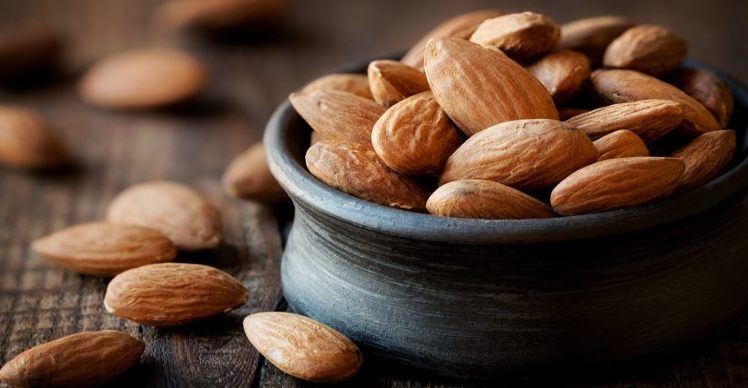If you are one of those who are looking for an answer to the question “Does eating almonds contribute to sleep?”, here is a prompt answer for you:
- Yes, eating almonds may induce sleep, thus helping you avoid insomnia.
However, saying – almonds are good for sleep – is not enough. We should be able to provide our reasons and cite the studies that point to the accuracy of this claim.
This is exactly what we intend to do. Below, we are going to give you 4 reasons that could explain why almonds are a good choice when it comes to sleep. Besides, we will refer to relevant studies.
Insomnia
Many tend to think that insomnia is the difficulty of falling asleep. This is indeed a strong sign of insomnia, but not the only one. Not being able to stay asleep and get back to sleep are also signs of insomnia (1).
If you don’t suffer from insomnia you should feel lucky. This is because according to various studies; 30% of the population – may be more – is estimated to suffer from insomnia (2),(3),(4),(5).
Especially, older adults are more susceptible to this common sleep disorder.
Since insomnia is quite common, many insomnia sufferers search for ways to overcome it. In fact, there are various ways; however, one of the easiest ways to get a good night’s sleep is to consume sleep-inducing foods and drinks.
If you searched about sleep-inducing foods and drinks on the internet, you’d see the name “almonds” in almost every article or video.
That suggests; that we are not the only ones who claim almonds can be a good choice when it comes to having a good night’s sleep.
You can also read the article ” 13 foods that cause insomnia “, which we published on this website.
Sleep-Promoting Nutrients in Almonds
Almonds contain various essential nutrients; therefore, considered one of the healthiest snacks. However, in this section, we will look at only sleep-promoting nutrients that are present in almonds.
After all, it is not almonds’ colour or taste that makes these nuts an ideal bedtime snack. Certain nutrients found in almonds are the main reason why these tasty nuts are associated with better sleep.
Here are the sleep-inducing nutrients available in almonds:
- Magnesium: 100 gr almonds contain 270 mg magnesium, which equates to approximately 65% of your daily magnesium needs (6).
- Calcium: 100 gr dry roasted almonds contain roughly 270 mg calcium. Please note that the recommended daily calcium intake is 1000 mg for adults (7),(8),(9).
- Tryptophan – (Melatonin)
Almonds and Better Sleep
Now, we know that magnesium, tryptophan and calcium are the main reason why almonds are associated with better sleep. But, it begs the question: how do these particular nutrients improve sleep?
Please continue reading to see a science-backed answer to this question.
1-) Almonds + Tryptophan = Sleep
If we need to define it briefly; tryptophan is an essential amino acid that has several roles in the human body (10). This amino acid also influences the sleep-wake cycle and promotes sleep.
So how does this amino acid affect sleep? What does this amino acid do in terms of sleep?
First of all, it is important to underline that tryptophan itself doesn’t make you sleepy. However, this amino acid is indispensable for the production of sleep hormones, namely serotonin and melatonin (11), (12).
The pineal gland (in the brain) starts producing melatonin in the darkness to make you sleepy. The production stops when exposed, for instance, to daylight to help you wake up (13),(14). That indicates: melatonin regulates the sleep-wake cycle.
If the melatonin production becomes insufficient for any reason, sleep disorders, including insomnia, can happen as a result. That, in turn, negatively impacts the quality of life.
Tryptophan is also necessary for serotonin production. Serotonin is thought to have a role in maintaining sleep and wakefulness. Tough, its role in sleep isn’t fully understood by scientists (15),(16),(17).
Cow’s milk, too, contains this essential amino acid. In fact, this is why many people have the habit of drinking warm cow’s milk before going to bed (18),(19).
Conclusion: your body needs tryptophan to produce melatonin, which induces sleep at night. Since this amino acid is available in almonds, technically eating a handful of almonds a couple of hours before going to bed should make you sleep
2-) Almonds + Magnesium = Sleep
According to growing evidence and medical experts; magnesium can improve sleep quality, thus helping individuals beat insomnia.
Before explaining how magnesium aids your sleep, it is important to underline that almonds are extremely rich in magnesium!
To be more precise; a handful of almonds (roughly 30 gr) contains approximately 80 mg of magnesium; that is nearly 25 per cent of recommended dietary allowance for magnesium for adult women.
So how does magnesium contribute to your sleep? How do scientists explain the relationship between sleep and magnesium?
The first reason that magnesium is beneficial for sleep is that magnesium has relaxing properties. This essential mineral can ease tension in your blood vessels, thus promoting relaxation. Various studies confirmed that magnesium can help reduce both stress and anxiety (20),(21),(22).
Needless to say, both stress and anxiety are sleep killers. When your body and brain are not relaxed enough, falling and staying asleep can be an ordeal.
In addition to its relaxing property, magnesium has also the ability to reduce inflammation (23),(24). That is important because chronic inflammation can be strong enough to keep people awake or prevent them from falling asleep.
There are also studies that show a positive correlation between magnesium and sleep. For instance;
A rodent study found that both high and low magnesium levels in the body can lead to sleep problems; Upon this, researchers concluded that optimal magnesium level is necessary for normal sleep regulation (25).
Another study (human study) showed that magnesium supplementation may have a sleep-promoting effect, especially in elderly people (26).
Summary: Growing evidence shows that magnesium has a role in quality sleep. As such, we should say that eating a handful of magnesium-rich almonds can help you sleep better.
3- Almonds + Calcium = Sleep
Almonds, like other nuts, are an excellent source of calcium, which is another nutrient that is heavily associated with better sleep.
More precisely though; a handful of almonds could give you roughly 80 mg of calcium, which equates to about 10 per cent of your daily calcium needs.
So what is the relationship between calcium and sleep? In other words, how does calcium help you sleep better?
Let’s see what doctor William Sears, M.D has to say about calcium and sleep.
According to William Sears: “Calcium helps the brain use the amino acid tryptophan to manufacture the sleep-inducing substance melatonin. This explains why dairy products, which contain both tryptophan and calcium, are one of the top sleep-inducing foods.” (27), (28).
It appears that calcium helps the brain to produce melatonin, the sleep-inducing hormone.
Besides; according to a well-rounded study, which was republished in 2014: calcium may promote sleep, thus helping individuals beat insomnia (29).
The Bottom Line
If you have a chronic sleep problem, we heavily recommend you talk to your health care provider. Because prolonged sleep disorders can damage your health in many ways.
On the other hand, if you think your sleep problems are manageable, home remedies such as meditation and exercise can also reduce the frequency of your sleep problems.
We have discussed one of these natural remedies; almond. It appears that almonds can promote sleep owing to their sleep-inducing nutrients mainly tryptophan or magnesium. Like almonds, pistachios contain sleep-promoting nutrients and thus may help with sleep.
We ( or nobody) can’t guarantee you that almonds will certainly improve sleep. Yet, they can help you better cope with sleep problems or simply may increase your sleep quality.
Try to eat a handful of almonds 2 hours before sleep. And, determine whether almonds have a positive impact on your sleep.
If you don’t want to eat crispy almonds before bed, alternatively you can opt for warm almond milk, which may also promote sleep.
Consideration: Excessive amounts of both almonds and almond milk may increase the risk of developing kidney stones because of their high oxalate content.
Tarkan is an experienced health writer ( currently more than 600 articles ) and also the founder of this website namely www.neededforhealth.com. His expertise in health stems from in-depth medical research and knowledge which he obtained over the course of many years.
Tarkan enjoys sharing factual knowledge on health, psychology and nutrition. He always aims to deliver evidence-based recommendations, provide links to related scientific studies.





